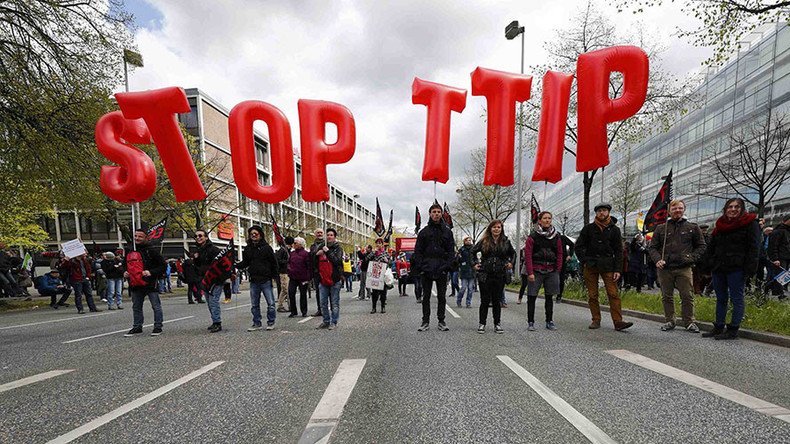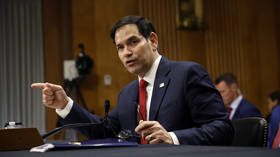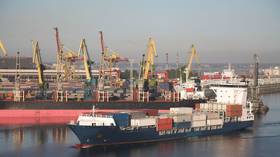LEAKED: Explosive TTIP documents expose plans for corporate takeover, dismantled climate protection

Climate protection, jobs, food safety and online privacy rights will be whittled away under the controversial Transatlantic Trade and Investment Partnership (TTIP), an explosive tranche of leaked documents suggest.
The leaked texts, which shed light on secretive EU-US trade negotiations, indicate TTIP could tear asunder environmental and consumer protections many Europeans hold dear.
Greenpeace Netherlands published the documents on Tuesday to dismantle a veil of secrecy over the watershed deal and lay bare its implications for climate protection, human health, labour rights, internet privacy rights and the very social fabric of Europe itself.
Leaked #TTIP papers confirm worries of millions of citizens on EU-US trade deal https://t.co/sL8YA3Jrs2#TTIPleakspic.twitter.com/uTaE6h6pIs
— Tom Lowe (@anewlowe) May 1, 2016
The NGO, which has a long history of environmental campaign work and research, obtained the negotiation texts from an unknown source. It worked with a number of high-profile media outlets on the data, including Hamburg-based TV station NDR, Cologne-headquartered public broadcasting group WDR and Munich-based newspaper Süddeutscher Zeitung.
Death knell for TTIP?
TTIP will create the world’s biggest free-trade zone, scrapping tariffs and other obstacles to the trade of goods and services between the US and the EU. Supporters insist it will encourage investment and create employment, while critics warn it will mark a decline in state sovereignty as Europeans know it.
The leaked documents, obtained by Greenpeace Netherlands, shine a light directly on the negotiation positions of the EU and the US, and give roughly 1 billion citizens across Europe and America the opportunity to have an informed debate on the deal.
TTIP’s opponents from Bristol to Brussels have branded this latest disclosure the trade agreement’s death knell.
Things we've learned from the #TTIPLeaks:
— RT UK (@RTUKnews) May 3, 2016
1. 'We're being sold down the river by our reps in the EU' - @WarOnWanthttps://t.co/CWH0smP0kY
Executive Director of UK social justice campaign War on Want John Hilary said the leak uncovers how TTIP threatens jobs, food safety and the democratic foundations of Europe.
“It is even worse than we feared,” he said. “Today’s leak shows the European Commission preparing to sell us down the river, doing deals behind closed doors that will change the face of European society forever.
“It is simply unacceptable that a group of unelected officials should be allowed to contemplate such a thing without any public scrutiny.”
Following the 248 page #TTIP leak today? Don't feel powerless:https://t.co/D88cmVwZ9Gpic.twitter.com/4BGOMFQ8JG
— Friends of the Earth (@wwwfoecouk) May 3, 2016
Hilary went on to suggest the leak signals TTIP’s demise.
“Total secrecy was the only way the European Commission could keep the European people from learning the truth about these appalling negotiations, and now the cat is out of the bag,” he said.
“We call on the governments of Europe to halt the TTIP talks immediately, disband the EU negotiating team and hold a public inquiry into how such a damaging set of negotiations was ever allowed to get this far.”
Following in-depth analysis of the leaked documents, Greenpeace Netherlands and other anti-TTIP groups highlighted a number of key criticisms.
1. Profit over humanity, animal & plant life
The negotiating texts indicate that the trade deal, in its current form, will likely see progressive EU policies that were put in place to protect the planet scrapped.
Absent from the 248-page leak is a single reference to what’s known as the General Exceptions rule.
This 70-year-old regulation, enshrined in the World Trade Organization (WTO)’s General Agreement on Tariffs and Trade (GATT), ensures that cross-border trade deals are regulated in a manner that protects human, animal and plant life – while preventing over-consumption of valuable natural resources.
2. Eroded climate protections
Also absent from the vast collection of leaked papers is a mention of what many environmental commentators dub the most pressing issue of our time: climate protection.
Key sections in the texts, titled “Market Access for Industrial Goods” and “Regulatory Cooperation,” outline proposals for limiting the impact and scope of vital measures put in place to tackle climate change.
Half of the world's investors are doing nothing to address climate change. https://t.co/ZRvzsmaVGKpic.twitter.com/ZtzsKUx7I1
— Greenpeace (@Greenpeace) May 3, 2016
One particularly troubling concern flagged by Greenpeace Netherlands is the fact that EU regulation on importing CO2-heavy fuels like Tar Sands and oil would evaporate under these proposals.
Such a policy shift undercuts one of the key environmental protection strategies laid out under the Paris Climate Agreement: to limit further temperature increases to less than 1.5 degrees. An overwhelming majority of climate scientists worldwide – climate sceptics excluded – argue anything less will entrench the global climate crisis, endangering billions.
3. Gateway for hazardous chemicals & GM food
The precautionary principle, which is laid out in Article 191 of the Treaty on the Functioning of the EU, is also absent from the negotiation texts. The measure aims to build a better framework of environmental protections via risk analysis and policy intervention.
In the case of products that could endanger human, plant or animal life – or drive environmental degradation – it is used as a vital tool to withdraw hazardous commodities from the market.
4 major environmental concerns from the US-EU trade deal #TTIPleakshttps://t.co/lyl6OvZv5tpic.twitter.com/glvPU42kOf
— Greenpeace (@Greenpeace) May 3, 2016
It is also used to strip suspect produce from market circulation in cases where aggregate scientific research does not offer a comprehensive picture of potential risks.
The leak also reveals that TTIP will open European floodgates to US-produced genetically modified (GM) food and other products currently prohibited in the EU on environmental and public health grounds. Campaigners warn this would signal the abandonment of vital European regulatory standards.
4. Bias toward big business
Corporations have been afforded a glowing opportunity to have their say on TTIP, yet civil society has had virtually no access to the secretive negotiations. Apparent in the 248-page collection of leaked documents, is a clear bias towards big business.
While civil society actors have been largely locked out of TTIP talks, the leaked papers reveal the iron-cast influence corporate actors have wrought over the negotiations.
Encouraging news on #TTIP & #CETA? Nick Dearden of @GlobalJusticeUK has the highlights. https://t.co/U7zojp87zrpic.twitter.com/njpQlqgVK4
— Common Weal P & K (@commonwealpk) May 3, 2016
The European Commission (EC) has been anything but transparent about the extent of this corporate influence, according to Greenpeace Netherlands. The Commission’s most recent report on TTIP only mentions industry involvement in the talks once, while the leaked documents show that industry input has been dutifully noted and recorded throughout the negotiation process. The texts also regularly reference a need for further consultation with corporate actors.
5. ISDS mechanism: a done deal?
Analysis of the leaked papers show that the investor state dispute settlement (ISDS) clause central to TTIP is a high priority for Washington. The corporate court mechanism would allow multinationals to sue governments over lost profits. The negotiation texts, obtained by Greenpeace Netherlands, show the US has shot down proposed alternatives to this measure tabled by the EU.
Critics warn EC negotiators appear prepared to barter away EU states' sovereignty for a quick buck born of US corporate contracts.
#TTIP treaty which campaigners say could harm #NHS rocked by massive document leakhttps://t.co/rCZh3EBHGMpic.twitter.com/0vCP5fBTpw
— People's NHS (@PeoplesNHS) May 3, 2016
Faiza Oulahsen, a lead campaigner for Greenpeace Netherlands, said civil society across Europe should be troubled about what the documents uncover.
“Whether you care about environmental issues, animal welfare, labor rights or internet privacy, you should be concerned about what is in these leaked documents,” she said.
“They underline the strong objections civil society and millions of people around the world have voiced: TTIP is about a huge transfer of democratic power from people to big business. We call on all elected representative and other concerned parties to read these documents and engage in the debate.”
The leaked negotiation papers represent 13 of the 17 chapters that have been consolidated so far by the EC.
They had previously been shrouded in secrecy, viewable only by elected members of the European Parliament (MEPs) and other key Eurocrats. Those privy to the secretive texts were confined to reading them in a security-proofed chamber, in the absence of expert consultants. They were also banned from discussing their content with others.













